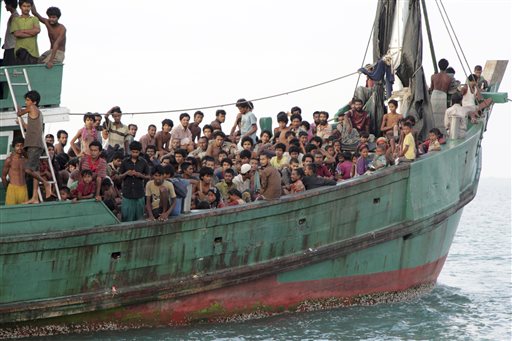
In this Wednesday, May 20, 2015 file photo, migrants sit on their boat as they wait to be rescued by Acehnese fishermen on the sea off East Aceh, Indonesia. Many of the thousands of migrants abandoned at sea in Southeast Asia this month are Rohingya Muslims who fled their home country of Myanmar. The Rohingya are a Muslim minority in predominantly Buddhist Myanmar, also known as Burma. Numbering around 1.3 million, they are concentrated in western Rakhine state, which neighbors Bangladesh. AP PHOTO
SYDNEY, Australia–Indonesia has told Australia that most of the migrants stranded at sea in Southeast Asia are illegal laborers from Bangladesh, not oppressed Muslim Rohingya, Foreign Minister Julie Bishop said in comments published Saturday.
More than 3,500 migrants have swum to shore or been rescued off the coasts of Malaysia, Indonesia, Thailand and Bangladesh since a Thai crackdown on human-trafficking in early May threw the illicit trade into chaos.
Speaking to The Weekend Australian newspaper, Bishop said Indonesia estimated that only 30 to 40 percent of the thousands still stranded at sea were Rohingya — an impoverished Muslim community from Myanmar’s (Burma’s) western Rakhine state.
READ: Latest on Rohingya: Myanmar rescues over 200 boat people
“They (Indonesia) believe there are about 7,000 people at sea [and] they think about 30 to 40 percent are Rohingya, the rest are Bangladeshi; and they are not, in Indonesia’s words, asylum-seekers, they are not refugees — they are illegal labourers. They’ve been promised or are seeking jobs in Malaysia,” Bishop said.
“They said the Rohingya have gone to Bangladesh and have mixed up with the Bangladeshis who are coming to Malaysia in particular for jobs.”
READ: How do we solve a problem like the Rohingya?
Bishop said that Indonesia’s director-general of multilateral affairs, Hasan Kleib, had told her that on one vessel, Bangladeshis accounted for 400 of the 600 people onboard.
Myanmar has faced increasing international pressure to stem the exodus from its shores and deliver urgent humanitarian relief to thousands still trapped at sea.
On Friday it said its navy had rescued a boat in the Bay of Bengal and brought to shore 208 people.
Tin Maung Swe, a senior official in the western state of Rakhine, told AFP that “about 200 Bengalis” were onboard.
“Bengalis” is a term often used pejoratively by Myanmar officials to describe the Muslim Rohingya minority, 1.3 million of whom live in the country but are not recognized as citizens.
Australia, which maintains a hardline policy of denying asylum-seekers who arrive by boats resettlement and which turns back vessels when it can, has maintained its refusal to resettle any stranded boat people, saying to do so would encourage people-smuggling.
“I will say or do nothing to encourage people to take to the sea in boats and any suggestion that there is some kind of special resettlement program here in Australia for people taking to the sea in boats just encourages people-smuggling,” Prime Minister Tony Abbott said on Friday.
“So it would be utterly irresponsible of me or anyone to suggest for a second that we will reward people for doing something so dangerous.”